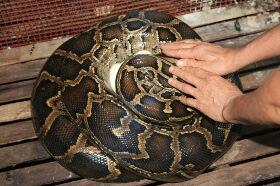Corporate Social Responsibility (CSR) and the python skin trade
Last week ITC in partnership with TRAFFIC and IUCN released a report on the trade in python skins. Many newspapers around the world including the BBC covered the story. The report also hit social media, with hundreds of blogs and twitter feeds written on the topic. This wide coverage underlies the strong interest in the sustainability of our supply chains. Here are some personal reflections on the major brands and their Corporate Social Responsibility in the python skin trade.
What is the true price of these shoes? Image: Caillabet/TRAFFIC |
Several high profile brands like Gucci in the PPR group are active in the python skin trade. PPR report on their website their commitment to sustainability and cooperation with the report's preparation. "…only precious skins of species listed by CITES are used and are accompanied by a certificate of legal origin issued by the CITES management authority of the exporting country, in order to ensure that the survival of the species is not endangered" PPR and fashion brands are meeting the minimum legal requirement by using a CITES permit. Traders and brands we spoke to in researching the report are also aware that the use of CITES permits does not necessarily ensure sustainable use. When obtaining a CITES permit, the exporting country agrees to comply with Article IV of the Convention; the 'Non Detriment Finding'. This states that exports of the product pose no threats to the sustainability of the species. Seeing as the permits are issued by sovereign States, it is clearly the Governments' reponsibilty to enforce this. However, many exporting countries often lack the capacity to carry out sustainability assessments of python skins. PPR and other players in the fashion industry are aware of this lack of control capacity and thus the permit system gets abused. |
The question in today’s age of growing vertical integration of global value chains (i.e. greater control by corporations over their supply chains) is whether responsibility for sustainable use lies solely with Governments. Many would argue that corporations have the resources available to protect biodiversity, ensure legality and provide adequate animal welfare.
There is therefore widespread expectation that corporations should go beyond meeting minimum legal standard and introduce their own traceability schemes to complement the CITES system. Complementary schemes of this nature already take place with shoe manufacturers in the crocodile skin trade as well as certified timber and food markets. It is time the same approach is implemented in the python trade.
Back to the main page of ITC environment blog.
You can also follow Alex on Twitter.





